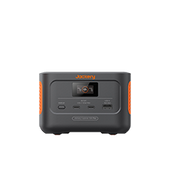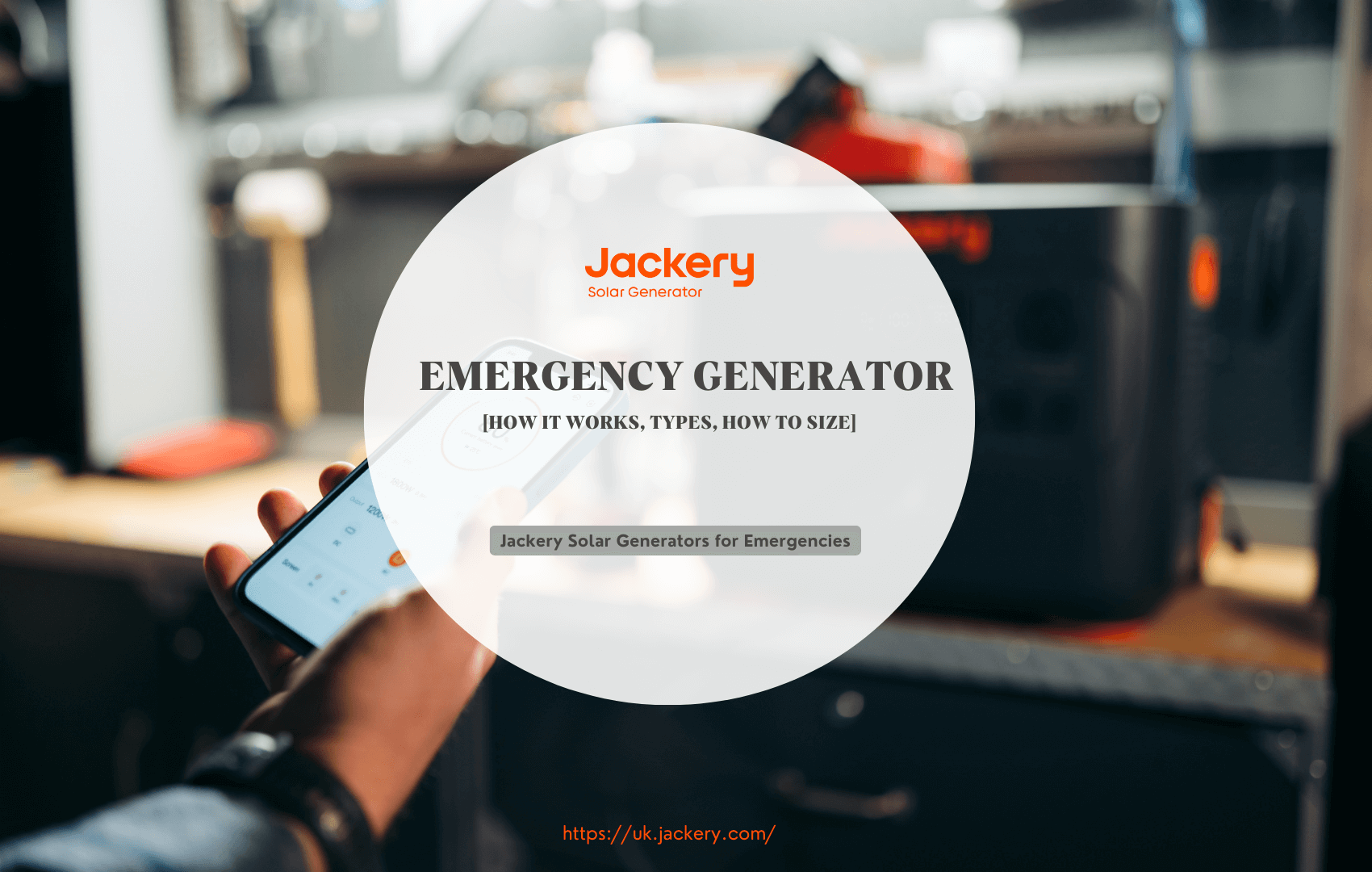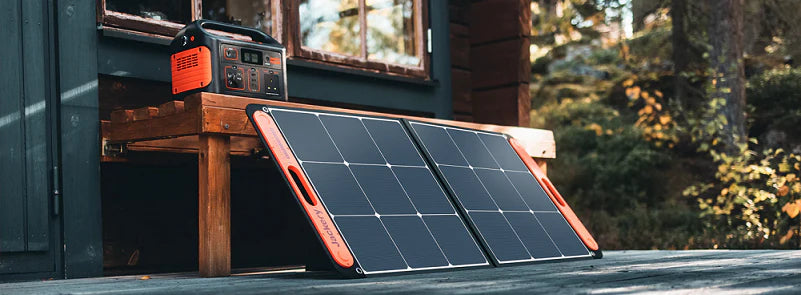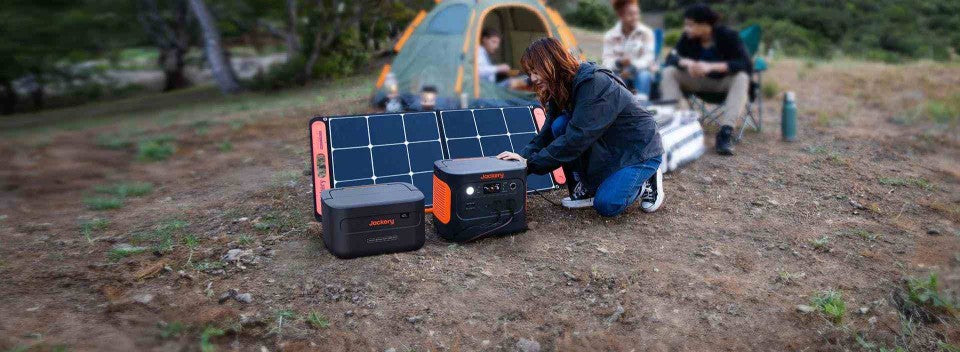Imagine being plunged into darkness at night when the power goes out. In such situations, an emergency generator is like a lifeline, providing you with a steady, uninterrupted electricity or power supply.
Whether you are facing a temporary power outage or preparing for an unexpected storm, knowing about emergency generators is essential to ensure peace of mind and an uninterrupted power supply.
This guide will cover everything about the emergency generator for your home or business. Besides, we highly recommend Jackery Solar Generator, a portable solar power solution to charge your appliances during an emergency. If you worry about the bad weather, the Portable Power Station can be recharged by wall outlets or carport.
|
Key Takeaways: |
|
Emergency generators are a backup power solution for running homes and businesses. Emergency generators work by transforming mechanical energy into electrical output. When choosing the right emergency generator, consider power demand, fuel type, noise, budget, etc. Choosing the correct type of emergency generator is essential to meet your specific needs. There are still many aspects to pay attention to when using and maintaining emergency generators. We highly recommend Jackery Solar Generator 2000 Plus, 1000 v2, and 500 for emergencies or blackouts. |
What Is An Emergency Generator?
As the name implies, emergency generators are used during times of crisis and uncertainty. Imagine that suddenly a storm hits and the power grid fails, plunging your house into darkness with lights, appliances, etc. offline. In short, a sudden power outage will affect your everyday life. So, most people know how essential emergency generators are.
So, what is an emergency generator?
An emergency generator is also an emergency backup power source that kicks in when your regular power fails and ensures that essential appliances such as refrigerators, heating systems, and lights continue to operate, keeping you comfortable and safe. In short, an emergency generator keeps your house functioning when there is a power outage.
Benefits of Emergency Generators
Generally speaking, emergency generators are backup sources of power that homes and businesses use during power outages. So, what are the specific benefits of emergency generators?
- Emergency generators help protect sensitive appliances and electronic equipment by quickly restoring power.
- Emergency generators ensure that indoor temperatures remain comfortable, reducing the impact of extreme temperatures.
- Using emergency generators to power refrigerators and freezers can reduce food spoilage during power outages.
- Emergency generators will keep critical safety systems (such as security alarms, surveillance cameras, and emergency lighting) up and running during power outages.
- Emergency generators can quickly provide power when needed, providing immediate assistance during unpredictable weather emergencies.
How Does An Emergency Generator Work?
An emergency generator is a fixed combustion device with a regenerative engine or turbine. When the main power supply is interrupted or interrupted due to a power outage or any natural disaster beyond the control of the facility operator or owner, the emergency generator can be used as an auxiliary source of electrical or mechanical power.
The working principle of the emergency generator is to use the combustion energy of the internal combustion engine (natural gas, propane, or diesel) to generate high-temperature and high-pressure gas through combustion to drive the movement of the piston, thereby rotating the rotor of the generator, and then converting mechanical energy into electrical energy output.
When the external power grid is interrupted or cannot provide stable power, the emergency generator can be started quickly, generate power through fuel combustion, and drive the generator set to generate power output to meet the power demand.
How to Size An Emergency Generator?
Investing in an emergency generator is a great way to protect your family, property, and peace of mind during unforeseen power outages and emergencies. When choosing the right emergency generator, you should generally consider two aspects: power requirements and fuel type.

The first thing you need to consider is your power requirements. These are all the electricity you intend to provide to the entire generator at once, so think about the wattage of the machines and equipment you need to keep running simultaneously.
To calculate your power requirements, follow these steps:
Step 1: List the appliances you need to power with the emergency generator.
Start by listing the wattage of all the appliances you plan to power with the emergency generator, including essentials such as refrigerators. Power information can usually be found on the appliance or user manual. If you need help finding the power information for an electrical appliance, contact the manufacturer or browse its website.
The table below shows the power information for some common appliances in the UK.
|
Appliance |
Average Power Rating |
|
Laptop |
100W |
|
Freezer |
100W |
|
Television 55” UHD |
120W |
|
Electric blanket |
300W |
|
Microwave |
1500W |
|
Dishwasher |
2200W |
|
Washing machine |
2200W |
|
Hair dryer |
2200W |
|
Kettle |
3000W |
Step 2: Calculate your combined power needs.
To calculate your combined power needs, add the wattage of all the devices you need to power. If you add up the maximum wattage required by the appliances, you will get your total power needs in Watts (W) or Kilowatts (kW).
Here is an example of how to calculate your power needs:
100W (Freezer) + 1500W (Microwave) + 2200W (Dishwasher) + 2200W (Washing machine) = 6000W/6kW(power needs)
So, in this example, the power needs are 6000W.
Step 3: The common sizes of emergency generators.
Emergency generators vary in power capacity, so consider whether you need a small, medium, or large one. The main thing to consider when choosing the right emergency generator is whether it is large enough to meet your power needs efficiently.
To help you choose the right emergency generator, the table below shows its different sizes and their daily uses.
|
Emergency Generator Sizes |
Power Supply Range |
Common Uses |
|
Small Generators (1,000-2,000 watts) |
Small appliances (such as portable TVs, radios, and light bulbs) |
Outdoor recreational activities, emergency power (home) |
|
Medium Generators (3,000-5,000 watts) |
Large appliances (such as refrigerators, freezers, space heaters, and sump pumps) |
Emergency power (home or small business) |
|
Large Generators (6,000-10,000 watts) |
Most household appliances, power tools, large construction lights |
Emergency power (home or small and medium-sized business), construction sites |
|
Extra Large Generators (10,000 watts and up) |
Multiple large appliances, whole home systems, and many job site tools |
Large residences with high power demand, large outdoor events, emergency power (small and medium-sized businesses) |
Types of Emergency Generators
There are different types of generators to choose from for emergency power sources. Different types of emergency generators suit different aspects, so choosing the right one is crucial to meet your needs. Generally, emergency generators are divided by usages and fuel types.
Emergency Generators by Usages
There are mainly three types of emergency generators classified by usages, including standby, portable and inverter generators.

A. Standby Emergency Generators
Standby generators are an excellent choice for seamlessly transitioning power during a power outage. They can also be used as whole-house generators, generating enough electricity to power an entire house or building in an emergency.
Standby generators are usually on standby and permanently placed outside a house or building. Because standby generators are designed to provide much power, they are more extensive. When the power goes out, they automatically start and efficiently power your entire home or specific circuits.
B. Standby Emergency Generators
Unlike large standby generators, portable generators are compact devices that can be moved and used in more flexible scenarios. Therefore, they are ideal for small-scale needs or flexible situations. Instead, they are better suited to powering some essential appliances.
In conclusion, portable generators are affordable and ideal if you need to power only some essential appliances or devices during a power outage.
C. Standby Emergency Generators
As we all know, inverter generators use unique technology to produce clean and sustainable energy. They are also quieter, more fuel-efficient, and safer than traditional generators. Large inverter generators can power an entire house, medium inverter generators can power an RV, and small inverter generators can power a camper or boat.
|
Types of Emergency Generators |
Pros |
Cons |
|
Backup Generators |
Continuous power supply High fuel efficiency Increases home value |
Large footprint Low flexibility High initial cost Regular maintenance Noise pollution Safety risks |
|
Portable Generators |
Compact Affordable Flexible Multiple fuel options |
Limited power supply Minor noise pollution Regular maintenance Safety risks |
|
Inverter Generators |
Quiet operation Safety Fuel efficiency Small size Lightweight Environmentally friendly |
Costly Difficult to repair |
All three types of generators have unique advantages and disadvantages. Understanding the differences between each type can give you valuable insights when choosing an emergency generator. So, before you buy, evaluate your specific needs to confirm which type of generator will best meet your requirements.
Emergency Generators by Fuel Types
Choosing the appropriate fuel source for your emergency generator is a critical decision directly affecting its performance.

A. Gasoline Emergency Generators
Gasoline generators are popular for home and commercial use because they tend to be affordable compared to other generators. However, gasoline has a relatively short shelf life and may not be suitable for long-term power outages or emergencies that last longer than expected. Gasoline storage requires care to prevent spoilage.
B. Diesel Emergency Generators
Diesel generators are standard for large standby generators in commercial and industrial settings. Diesel is cheaper than gasoline, making it more cost-effective in the long run. Diesel generators outperform petrol generators in efficiency, using less fuel to generate power. They can burn less than half the fuel used by natural gas generators. They usually aren't inexpensive and need ongoing maintenance.
C. Propane Emergency Generators
Propane has a long shelf life but is also highly flammable and must be stored carefully. Propane generators emit fewer pollutants compared to diesel generators. It needs fewer oil changes than petrol or diesel generators. Propane generators tend to cost more than gasoline or diesel generators.
D. Solar Emergency Generators
Solar generators are a worthwhile option because they save on fuel costs and produce virtually no pollution. Solar generators are portable and serve as an effective backup power source for camping or off-grid living. They can save money over time since there are no ongoing fuel expenses. The solar generators from Jackery could be a nice choice, and keep reading.
Jackery Solar Generators for Emergencies
As we mentioned above, the solar generator is one the most optimal choice for emergencies, since it doesn’t have noise or any pollutant, which is safe to use at home. There are many brands for solar generator, and Jackery is one of the best.
Jackery Solar Generators are comprised of SolarSaga Solar Panels for solar energy capture and Explorer Portable Power Stations for energy storage for further utilisation. The generator may supply power to numerous items, including but not limited to refrigerators, TVs, computers, lights, and more.
Moreover, this solar generator is user-friendly and necessitates minimal maintenance, rendering it a dependable option for emergencies or blackouts. Here, we recommend Jackery Solar Generator 2000 Plus, 1000 v2, and 500.
|
Appliances |
Solar Generator 2000 Plus (2-12 kWh) |
Solar Generator 1000 v2 (1070Wh) |
Solar Generator 500 (518Wh) |
|
Fridge (350W) |
4.7-29H |
2.9H |
1.3H |
|
Lighting (25W) |
65.3-408H |
40.3H |
17.6H |
|
TV (60W) |
27.7-170H |
16.8H |
7.3H |
|
Phone (10W) |
163-1020H |
100.8H |
44.03H |
|
Coffee Maker (550W) |
3-18.5H |
1.8H |
0.8H |
Jackery Solar Generator 2000 Plus
Jackery has introduced the Solar Generator 2000 Plus, a state-of-the-art portable power solution that delivers outstanding performance. With its impressive capacity and powerful output, this device can support the operation of typical household appliances for weeks, which is best for emergencies or power outages.

- Expandable Powerhouse for Your Appliances: The Jackery Solar Generator 2000 Plus enables the addition of extra battery packs, increasing the capacity from 2 kWhto an impressive 12 kWh, thereby significantly improving the solar charging capabilities. This solar product has remarkable output to 3000W, providing a 30% higher rated power than other 2 kWh solar products. Almost all necessary household appliances are powered.
- Higher Resistance & Reliability: The Explorer 2000 Plus stands out as a groundbreaking add-on battery pack that offers the convenience of recharging through solar panels. This feature increases versatility, boosts charging efficiency, and shortens charging time.
- Lower Noise for Safe Use at Home: The whisper-loud noise and quiet-charging mode make the Jackery Solar Generator 2000 Plus an ideal companion for home use. Reduced noise fosters a tranquil and pleasant atmosphere, alleviating stress and enhancing overall well-being.
|
*Review from Our User |
|
Absolutely, I understand! It's not exactly a generator. It’s a large battery that comes with solar panels designed to convert solar energy into stored energy, rather than generating anything. It's a great idea for those who are looking for a power source while also caring for the environment. |
Jackery Solar Generator 1000 v2
Jackery Solar Generator 1000 v2 is the smallest and lightest 1 kWh solar generator for emergencies, which pair Explorer 1000 v2 portable power station with SolarSaga 100W solar panels. Compared to Solar Generator 2000 Plus, it more suitable for charging appliances of your RV, off-grid tiny house, or campervan during an emergency.

- Charging Several Appliances in Emergencies: The Explorer 1000 v2 portable power station provides a phenomenal 1500W output, 50% more than prior editions, to efficiently run high-demand needs, including refrigerators, ovens, portable air conditioners, etc. With USB-A/C connections and up to 100W dual PD charging, it can charge several devices (phone, laptop) concurrently, therefore serving as the best friend for all your power requirements.
- Multiple Recharging Options: The Emergency Charge Mode lets the Explorer 1000 v2 Portable Power Station be wholly charged in less than an hour, providing vital power backup when your battery runs low. If you want to recharge it, it will take 5 hours, or 12 hoursfor car charging. Besides, using a SolarSaga 100W solar panel will take 15 hours to recharge fully.
- Higher Solar Conversion Rate: The Jackery SolarSaga 100W Solar Panel boasts a solar conversion rate of up to 25%; it is optimally designed for outdoor use and unforeseen power interruptions. The solar panel weighs about 8 lbs, is lightweight, foldable, and equipped with a convenient carry handle, enhancing its portability.
|
*Review from Our User |
|
The Jackery Explorer 1000 v2 bundle with a 100W solar panel is nicely priced here in the UK and can be found directly from Jackery. I think Jackery totally nailed it with the new upgraded V2 version of their Explorer model! It's like the perfect combo of power and weight! So impressed! |
Jackery Solar Generator 500
Jackery Solar Generator 500 is a little smaller than Solar Generator 2000 Plus or 1000 v2, but it is best for people who was being stuck outdoors during an emergency. It is the combination of Explorer 500 and SolarSaga 100W solar panel. Check below to learn more features which enable the safe and consistent use of power when emergency happens.

- Portable Power Solution for Electronics: The Jackery Explorer 500 stands out as one of the lightest and most portable rechargeable lithium battery generators available today. It includes a PURE SINE WAVE 500 wattAC outlet that delivers stable power to a variety of AC-dependent devices, such as portable fans, projectors, coolers, and lights, among others.
- Versatile Charging Outputs: This versatile portable power station is equipped with three USB ports, a 12V car output, and an AC outlet, ensuring reliable power for your appliances. The power station can be charged through three distinct methods: solar panels, a car outlet, and an AC adapter.
- Safe & Strong for Multiple Uses: The Explorer 500 features an emissions-free energy source and a dependable battery management system, ensuring its safety for indoor use. Constructed from robust material, the solar system exhibits resistance to high temperatures. The Explorer 500 power station operates within a temperature range of 14-104℉ (-10-40℃), while the SolarSaga 100 functions between 14-149℉ (-10-65℃).
|
*Review from Our User |
|
I enjoy working outdoors whenever I can. it's the essence of exploring remote areas. To achieve that, you need a portable option to take outside, and I choose the Jackery Solar Generator 500. |
How to Choose The Best Emergency Generator in The UK?
Choosing an emergency generator may seem simple, but several important factors must be considered to find the most suitable one.
Noise Level: All emergency generators will produce a certain amount of noise when in use. So please consider the noise level requirements of the emergency generator based on the use scenario and personal needs.
A noisy generator may be acceptable for working on a construction site. However, you may need a quieter emergency generator if you plan to use it in a suburban area with noise restrictions. In contrast, solar generators make almost no noise when running.
Budget: Determine your budget and look for an emergency generator within your price range. Remember that the initial cost is only part of the total cost, so ongoing fuel and maintenance expenses should also be considered.
If you have a limited budget, prioritise emergency generators that meet basic needs and requirements.
Brand: Some of these generator brands have a good reputation for customer satisfaction and reliable product delivery. So please consider well-known brands that have a history of producing reliable generators. Jackery is such a big and trustworthy brand offering reliable solar products.
Maintenance: Like all machines, emergency generators require regular maintenance to ensure reliability. So please consider how easy it is to maintain the emergency generator and the availability of after-sales service.
Laws and Regulations: Please pay attention to any local building codes or noise regulations that may affect the installation and operation of the emergency generator. In addition, please find out in advance whether the selected emergency generator meets local emission regulations and environmental standards.
Emergency Generator Maintenance Tips
An emergency generator can provide convenient lighting, meet your cooling needs, and help you stay connected to the outside world. Therefore, having an emergency generator is both convenient and necessary. However, many aspects still need to be paid attention to when using and maintaining an emergency generator.

Keep It Clean
A dirty generator can cause many problems or failures that are challenging to detect, so clean your generator regularly.
Clean the air filter every six months or 50 hours to remove contaminants and improve airflow. After cleaning, you should replace the filter if you still find severe wear or yellow/brown stains.
Run It Regularly
Start the emergency generator once a month and run it for about 30 minutes. Regular operation can help you avoid problems with the emergency generator and safety hazards. In addition, perform load tests regularly and check the cooling system and electrical components (such as wiring, controls, and connections) for signs of wear or damage.
Store It Properly
Let the emergency generator cool for at least 30 minutes before storing it in a warehouse or garage. Then, wipe it with a cloth to remove dust, dirt, and debris. Finally, cover the emergency generator with a breathable cover to keep out dust, retain moisture, and prevent rust and corrosion.
Emergency Generator in The UK FAQs
The following are the frequently asked questions about the emergency generators in the UK:
- Do I need an emergency generator?
Most people wonder if they need an emergency generator for their home.
Suppose your community frequently experiences extended power outages due to storms or weather. If your family cannot tolerate power outages daily, you need uninterrupted power for medical equipment. There is no doubt that you need an emergency generator.
- Are emergency generators expensive?
The price of an emergency generator depends mainly on personal needs, such as the type and quantity of equipment in the emergency generator. For example, the purchase price of a gasoline generator is relatively low.
In addition, the price of an emergency generator depends on the accessories required. If the emergency generator is installed outdoors, a soundproof cover is required to protect the unit and prevent noise. If it is installed indoors, it must be equipped with an exhaust hose so that the exhaust gas can be safely discharged to the outside.
- Do emergency generators using different fuels produce different pollutants?
Of course, emergency generators using different fuels produce different pollutants.
Diesel and gasoline release higher concentrations of particulate matter and air pollutants. Cleaner-burning alternative energy sources such as natural gas and propane emit lower concentrations of air pollutants. In contrast, solar-powered emergency generators do not produce pollutants and are a greener choice.
- Are off-grid solar systems high maintenance?
Compared to other types of emergency generators, solar generators do not consume fuel, are more environmentally friendly, and make less noise. You may worry about the bad weather conditions, the power station (component of solar generator) can store electricity not only from sunlight, but wall outlets or carports. So, the solar generator can be an optimal choice for emergencies.
Final Thoughts
A practical backup power source is essential to maintaining your home's comfort, safety, and essential services when power goes out due to severe weather, natural disasters, or routine maintenance. Hence, an emergency generator is a worthwhile investment. Also, we recommend Jackery Solar Generator for emergency, since it is powerful, portable, and safe.





































































































